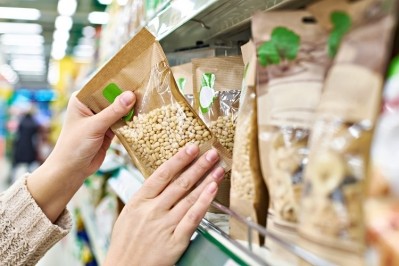Ultra-processing foods for health and sustainability: ‘Whether you like it or not, processed food is here to stay’

More than two-thirds of energy consumed around the globe comes from processed or ultra-processed foods, according to current classification standards.
But over the last decade, the perception of food processing has deteriorated. Many believe the more processed a food product is, the unhealthier it is.
This discussion has expanded beyond academia into dietary guidelines around the world. In France, Brazil, and Belgium, for example, official dietary recommendations advise a reduction of ultra-processed food and drink consumption.
According to Professor Ciarán Forde, Chair of the Sensory Science and Eating Behaviour Division of Human Nutrition at Wageningen University and Research, we should not be so quick to judge.
“Food processing and formulation are much more complex than simply the ‘good guys’ vs the ‘bad guys’,” he told delegates at a recent European Food Forum (EFF) event.
Deserving of its bad reputation?
Food processing is not a new concept. “We’ve been processing raw materials into more nutritious or more sensorially appealing food for many, many years, right back from the invention of fire…” the researcher explained.
Indeed, over the centuries humans have collated an impressive range of processing techniques, from fermentation to deep frying, pressure cooking, canning food, refrigerators, pasteurisation, food extrusion, fast food, the microwave oven, freeze drying, sous-vide cooking, molecular gastronomy, GMO food, and pulsed-electric food processing.
Interestingly, rarely do new food processes replace old ones. It is a case of ‘evolution rather than extinction’, explained Prof Forde, meaning there is less pressure to accept innovations in food processing.
Controversy surrounding new technologies has been heightened by new classification systems, such as NOVA, suggested the researcher
The NOVA system splits levels of food processing into four classifications, from raw and minimally processed food, to processed culinary ingredients, processed foods, and ultra-processed foods. This last category is an ‘industrial creation’ by definition.
Some ultra-processed food is deserving of its bad reputation. But not all, argues Prof Forde. “Sure, there is no question that some foods are indefensible in terms of their nutrient content,” he told delegates. But other ‘healthy’ products, such as food fortified with omega-3, or specialised ingredients used in sports nutrition, would also be classified as ultra-processed foods according to NOVA’s classification.
Spotlight on sustainability
There are a number of benefits associated with food processing, according to the Wageningen professor, including its ability to improve sustainability.
“Today, about one-third of the food produced is lost or wasted via inefficient practices. It’s important to emphasis that if you want to move to more sustainable diets, then the future is through processed food as well.
“In terms of the scope and scale of food processing to manufacture foods in a more sustainable fashion, it’s incredibly important to embrace processing and reformulation, not to try to remove it.”
Switching out animal products for plant-based alternatives is a good example. A growing number of consumers are interested in reducing their carbon footprints by consuming meat-free and dairy-free food and drinks products, for example.
Yet as Gehring et al’s 2020 study, published in the Journal of Nutrition, found, the intake of ultra-processed foods is higher among vegetarians and vegans than meat eaters: “This is due to the use of plant-based analogues of cow’s milk and meat that contain food additives.”
For Prof Forde, this suggests a need to reconcile concerns about food processing, which will be needed to support sustainable food production and sustainable diets, is required. “We need to decouple the ideas [of processing and sustainability]. There doesn’t need to be a conflict between the two.”
Cutting out the baddies
Reformulation – a strategy designed to enhance the nutrient density of food – is also a form of food processing.
Most commonly, food makers work to reduce content of fat, salt, or sugar, however other reformulation efforts include adding nutrients, fortifying products for LMIC countries, adding protein isolates for sports nutrition, and removing allergens.
Food reformulation is a common practice. So much so that Food Drink Europe estimates 50% of the products on our shelves today will be gone within five years, as food producers continue to innovate in formulation and production of their products.
However, if you reformulate a food it is still currently classified as ultra-processed, in fact, reformulation makes it even more ultra-processed, explained Prof Forde. “We should be careful not to disregard the potential for nutrient enhancement, fortification and reformulation to enhance food supply.
“We should embrace food processing and reformulation if we want to reduce the risk of nutrient or energy density excesses in our diet.”
‘An image problem’: Consumer perceptions vs reality
Another opportunity in embracing food processing lies in cleaning up its image. According to the professor, at least part of the reason for consumers’ rejection of processing and formulation is that the concept has an ‘image problem’.
“I think there is a lot of naivety in terms of where our food comes from, and often we think there is a farmer in a field and he’s picking an apple and it goes in the truck to the supermarket, where you can then buy it in a shop.”
This ideation does not reflect reality. In reality, the average apple on shelf is somewhere between 12 and 15 months old. This fact alone reflects the complexity of the food systems, stressed the professor. And it highlights the challenge for food producers and researchers to accurately communicate how food is produced and distribute it in a way that informs consumer choice based on facts, rather than on ‘fear’ or ‘emotion’ associated with food processing, he continued.
“Whether you like it or not, processed food is here to stay. And consumption of processed food is likely to increase in the future as we push for sustainability and reformulation,” Prof Forde concluded.
“We should defend the importance of food processing in terms of it providing access to appealing, nutritious food that provides food security and sustainability to millions around the world.”


























